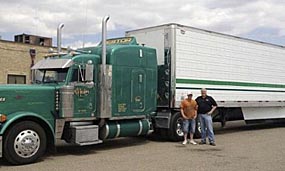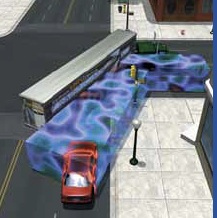Fast Facts
Take a look at Colorado’s Trucking Fast Facts.
Trucking Drives the Economy
-
 Employment:
Employment:In 2017, the trucking industry in Colorado provided 110,200 jobs, or 1 out of 20 in the state. Total trucking industry wages paid in Colorado in 2017 exceeded $5.7 billion, with an average annual trucking industry salary of $51,683. The U.S. Bureau of Labor Statistics (BLS) reported in May 2018 that truck drivers, heavy, tractor-trailer and light, delivery drivers, held 21,990 jobs with a mean annual salary of $46,960.
-
Small Business Emphasis:
As of April 2017, there were over 13,180 trucking companies located in Colorado, most of them small, locally-owned businesses. These companies are served by a wide range of supporting businesses both large and small.
-
Transportation of Essential Products:
Trucks transported 84 percent of total manufactured tonnage in the state in 2012 or 128,512 tons per day. Over 79.4 percent of Colorado communities depend exclusively on trucks to move their goods.
Trucking Pays the Freight
-
 As an Industry:
As an Industry:
In 2016, the trucking industry in Colorado paid approximately $459 million in federal and state roadway taxes and fees. The industry paid 35 percent of all taxes and fees owed by Colorado motorists, despite trucks representing only 6 percent of vehicle miles traveled in the state.
-
Individual Companies:
As of April 2018, a typical five-axle tractor-semitrailer combination paid $8,254 in state highway user fees and taxes in addition to $8,906 in federal user fees and taxes. These taxes were over and above the typical taxes paid by businesses in Colorado.
Safety Matters
-
Continually Improving:
At the national level, the large truck fatal crash rate for 2016 was 1.34 fatal crashes per 100 million vehicle miles traveled (VMT). This rate has dropped by 71 percent since the U.S. Department of Transportation (DOT) began keeping these records in 1975.
-
 Sharing the Road:
Sharing the Road:The trucking industry is committed to sharing the road safely with all vehicles. The Share the Road program sends a team of professional truck drivers to communities around the country to teach car drivers about truck blind spots, stopping distances and how to merge safely around large trucks, all designed to reduce the number of car-truck accidents.
-
Safety First:
Colorado Motor Carriers Association members put safety first through improved driver training, investment in advanced safety technologies and active participation in industry safety initiatives at the local, state and national levels.
Trucking and the Environment
-
 Fuel Consumption:
Fuel Consumption:The trucking industry continues to improve energy and environmental efficiency even while increasing the number of miles driven. In 2016, combination trucks consumed over 100 billion fewer gallons of fuel than passenger vehicles in the U.S. and accounted for just 17 percent of the total highway transportation fuel consumed.
-
Emissions:
Through advancements in engine technology and fuel refinements, new diesel truck engines produce 98 percent fewer particulate matter (PM) and nitrogen oxides (NOx) emissions than a similar engine manufactured prior to 1990. Sulfur emissions from diesel engines have also been reduced by 97 percent since 1999.
-
Partnerships:
 Through the U.S. Environmental Protection Agency’s (EPA) SmartWay Transport Partnership, the trucking industry is working with government and businesses to quantify greenhouse gas emissions and take steps to reduce them.
Through the U.S. Environmental Protection Agency’s (EPA) SmartWay Transport Partnership, the trucking industry is working with government and businesses to quantify greenhouse gas emissions and take steps to reduce them.
